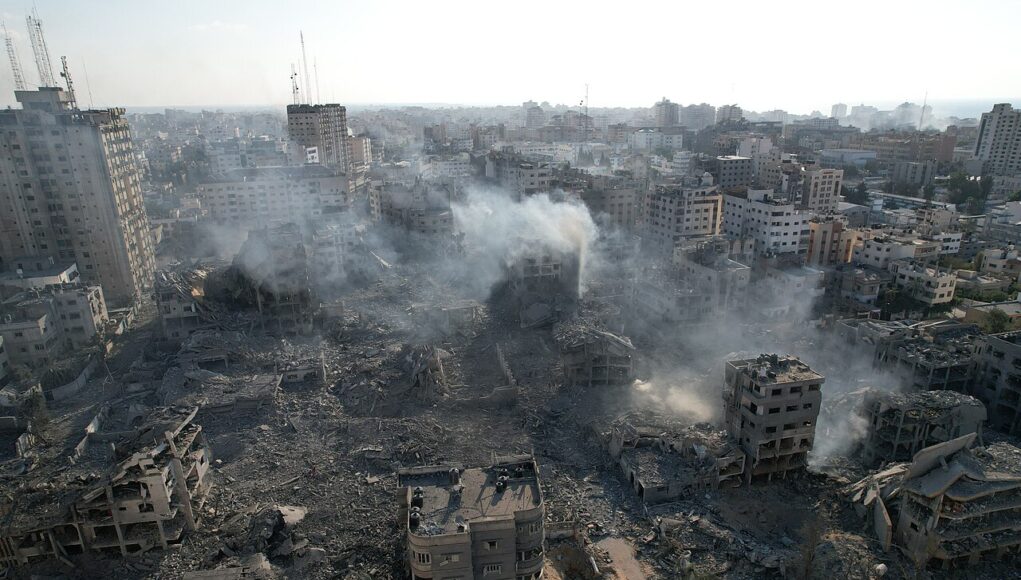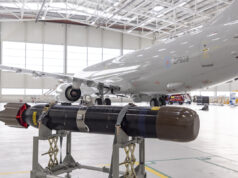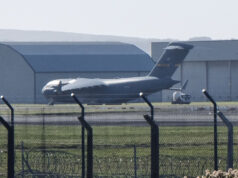As we predicted, there has been a marked escalation in tension in the Middle East following Israel’s targeted assassinations of prominent members of Iran’s proxies, Hezbollah and Hamas.
In Lebanon, Hezbollah’s leader Hassan Nasrallah has warned the conflict with Israel has entered a “new phase” as he addressed the funeral of military commander Fouad Shukur in Beirut, who was killed in an Israeli airstrike.
Meanwhile, in Tehran, Iran’s supreme leader prayed over the body of Hamas’ political leader, who was killed in a presumed Israeli assassination.
This article is the opinion of the author and not necessarily that of the UK Defence Journal. If you would like to submit your own article on this topic or any other, please see our submission guidelines.
Speculation continues over how exactly he was despatched, with world newspapers of the opinion that it was by remote detonation of an explosive device hidden in his guest quarters, whilst the IRGC – which was responsible for his security – claims it was a short-range projectile. They would say that wouldn’t they, as it gets them partially off the hook.
Be that as it may, it’s quite clear that we have moved closer to an all-out regional war. Arab sources apparently believe the response, whatever form it takes, will have to be more than the barrage of 300 drones and missiles used in April. Warnings have been passed to Iran on behalf of Israel and the USA that Israel is ready to go to war if Hezbollah and Iran respond too aggressively.
That being said, Israel is, by all accounts, preparing for a more complex and sudden onslaught than that of last April. Iranian officials warned Israel of their plans ahead of that attack, providing the US and Israel with time to prepare.
The US Department of Defense said on August 2 that it will “take steps” to support Israel’s defence and “mitigate the possibility of regional escalation.” It also reported that air—and sea-based cruise missile defences, ballistic missile defence-capable cruisers and destroyers, and a squadron of F-22s will shortly deploy to the Middle East.
Iran will most likely be taking into consideration US and allied support defending Israel as it considers how to cause greater damage this time. Previously the US, Israel, and allied countries in the region collectively intercepted approximately 99% of all munitions launched by Iran.
It is possible that Iranian-backed militia attacks targeting US bases in Syria could pull resources away from engaging and intercepting munitions bound for Israel. If the US had to focus on defending US ground positions in the region, it could well reduce the assets available to defend Israel.
Thus Tehran might think that a coordinated offensive targeting US forces in combination with a large-scale drone and missile attack conducted by the Axis of Resistance could be significantly more effective. But to do so would require careful timing and interplay which might be beyond their current capabilities.
Meanwhile American citizens have been urged to leave Lebanon on “any ticket available” as fears grow of the conflict spreading, adding that those who chose to stay should prepare contingency plans and be ready to seek shelter for extended periods of time. Similar warnings have been issued by the UK, Swedish, French, Canadian, and Jordanian governments.
Specifically, Britain advises against all travel to Lebanon and that British nationals still in the country should leave now while commercial options remain available. Additional Foreign Office personnel have been sent to the region – including Lebanon – to provide additional support as part of the UK government’s preparatory planning for a range of possible conflict scenarios.
Does this mean that we are heading inexorably towards an expanded regional war? No, it doesn’t, not yet anyway, and everyone hopes that wiser heads will prevail and an element of calm might return to the Middle East.
But it’s sensible to prepare for the worst while still hoping for the best, and that’s what many Western governments are now doing. Far better “jaw-jaw” than “war-war”, as history warns us.
The next few days will be crucial in deciding how the pendulum swings.
Lt Col Stuart Crawford is a political and defence commentator and former army officer. Sign up for his podcasts and newsletters at www.DefenceReview.uk














To be honest, it takes one side to make a war and two sides to make a peace. The question is does the Middle East have two sides that want to make a peace. The answer is clearly no. In a nutshell its the avowed aim of Iran and its proxy’s
1) destroy Israel and create a Muslim state in the whole of the historic and conquered lands of Islam ( those consecrated lands) which includes every bit of land Israel is built on.
2) remove any Islamic state that is at peace with Israel and the west…
3) remove any none Muslim power or interfere from the historic and conquered lands of Islam…
The question for them is not can they accept a peace…it’s when can they move their goals forward…infact it’s impossible for them to accept a lasting peace..it’s against their particular version of Islam and so the word of god.
on the other side of the of the fence, you have a government in Israel that itself is made up of some pretty hard line Zionists, who don’t believe in the original compromise made by Zionists groups to agree to a partitioning of the historic lands covered by the two kingdoms of the Israelites ( the kingdom of Israel and the kingdom of Judah) and very specifically the area of the West Bank..which actually forms a significant chunk of what was the historic kingdoms of Israel and Judah…there are specific religious and historical reason why the modern state of Israel was happy to abandon Gaza but has been completely unwilling to pull back from the West Bank…that’s the bit they have the historic and religious connection with.
Also in the mix you have the Arab kingdoms and there wish to remain connected to the wider world…which is not the wish of Iran or the wider Shiite population or even the more extreme of there own Sunni populations ( Sunni extremism is actually more of a perennial threat to Israel and the west than Shiite extremism..which is more state sponsored and focused on the need of specific states..AKA Iran).
https://x.com/HamasAtrocities/status/1820534916670779597 A missile pre-emptive strike.(?) Оnce again demonstrate the intentions of the Israel…
In 1920 France created a self governing state called Greater Lebanon following the capitulation of the Ottoman Empire after WW1. Which came about from the mandate given to France to incorporate the Mount Lebanon Mutasarrifate. Which was a mostly Catholic enclave. Following years of persecution and famine. The state lasted until WW2 where after being ruled by the Vichy French was invaded and taken over by UK and Commonwealth troops. Who then let the Free French take over, with the promise of an Independent Lebanon. Which was granted in 1945.
Since Independence, Lebanon had become a thriving and prosperous democratic country right up to the late 1970’s. Then things turned to shite. With mounting pressure from Arab Muslims, but also insurrection from Marxists. The Country slowly slid into civil war. Which on and off went on for 20 years. Israel, Syria and the UN have all tried to stop the factions from warring, but also spreading the conflict.
The state after multiple ceasefires and arbitration managed to agree on a joint Christian/Muslim Government. Where both sides happily ignore. Which is where we are today. Hezbollah was one of the smaller Shia Muslim factions, that rose to become the overall Muslim power in , supported by both Syria and Iran. It operates as a state within a state. Where its forces do not come under the control of the official Lebanese Government or Forces and in many respects is better equipped.
Hezbollah is a sworn enemy of Israel, they have a similar mandate to Hamas. But have better support especially from Iran. Both Israel and Hezbollah have been trading blows across the border for years. Where it became so bad, that Israel invaded Lebanon in 2006. They tried to get rid of Hezbollah, but they ultimately failed. Who have subsequently become stronger.
Hezbollah keeps poking the bear, at some point Israel will retaliate. The question is by how much? They found just do precision strikes on known bases, but also try and target the leaders. Or they could mount a similar operation to the one conducted in Gaza. Either way there is still a significant part of the Lebanese population who would happily help Israel. So it could kick off a civil war again.
Hezbollah are better organized than Hamas, and have been/are fighting in Syria. Plus there’s Iranians and probably Syrians who would aid Hezbollah from both a militia level and also Governmental.
Surrounding Countries such as Jordan and Egypt will likely want nothing to do with this conflict. As Hezbollah and Hamas are not viewed favorably. The one Country that is questionable is Turkey. Traditionally they have remained away from conflicts involving Israel. However the recent rhetoric from their President seems to counter this.
The ball is currently in Israel’s court. They have many options available to them. But I’d suggest they won’t jump in with both feet. But initially use air power to target specific sites and people. Hamas are still active in Gaza, so I believe they’d want to sort out that problem first. Before properly kicking off against Hezbollah. But I could be wrong!
thanks for the insightful glimpse of the real Lebanon, that the biased British media don’t give.
Good insights Davey, a good read. I’d like to add that the PLO were a major destabilising influence in a peaceful Lebanon. This was post the forced expulsion of the PLO from Jordan, where they were up to the same nonsense.
Interesting to note neither Egypt, Saudi Arabia, Qatar, UAE, Kuwait take no Palestinian refugees, the lesson is well leant.
My prediction is we will see the Israeli Gaza operation start to wind down with a major pivot towards Hezbollah. I’m concerned things will only escalate once again. I worry about Iran’s involvement as agent provocateur in this too – what a mess.
One thing I find bizarrely interesting is that the PLO were originally Marxist in their ideology. Later becoming more Islamic as Marxism went out of fashion.
After the PLO were unsuccessful with the coup in Jordan. None of the other Muslim Kingdoms/countries wanted to touch them with a barge pole.
I guess Jordan didn’t get much choice!
Good point re the PLO metamorphosis. Clearly, you have a good grip on the history of the thing.👌
As far as I know, no war was ever ended by jaw-jaw.
My personal view is that the UK should keep well out of this fight in the middle east. What have we gained from interfering? We have gained massive number of refugees that have brought the issues of the middle east to our shores. I think we should just let them fight it out until they get tired of fighting. It will drain the resources of Iran and its proxies fighting Israel…They just can’t live in peace side-by-side which makes you wonder why we are offering asylum from these places….Keep well out this fight in my opinion as these religious fanatics all have one screw loose. Look at Saudia Arabia, Qatar, UAE, Kuwait…not a single democracy between them…beware of the middle east its a place of tears, heartache, war, bigotry, intolerance and medieval views. They may look superficial modem but scratch the surface… The sooner we get energy independence the better and decouple ourselves economically from these places.
I need stay away from the whole cesspit.
Great observations and advice Andrew. Interesting to note neither Saudi Arabia, Qatar, UAE, Kuwait take no Palestinians or Syrian refugee, I wonder why that is?😉
12 USAF F22 landed in Lakenheath tonight from Alaska along with 8 KC46 tankers to Mildenhall, a pit stop on way to middle east to bolster strength
if in the unlikely event that a brief moment of peace was to happen in the cesspit part of the world, then the Israelis would complain aboutandy reeves having nobody to bombard.
This type of tension used to be normal for the Middle East. If anything until last year the middle east was going through a quiet period. Are things simply getting back to normal.